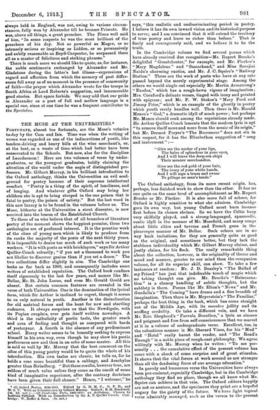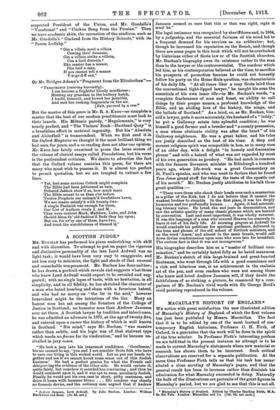THE MUSE AT THE UNIVERSITIES.* FORTUNATE, almost too fortunate, are
the Muse's votaries to-day by the Cam and Isis. Time was when the writing of verses was regarded as one of the indiscretions of youth, like tandem-driving and heavy bills at the wine merchant's, or, at the best, as a waste of time which had better have been consecrated to the Schools. But now, alas for the discipline of Lacedaemon ! Here are two volumes of verse by under- graduates, or the youngest graduates, boldly claiming the attention of the world under the aegis of distinguished pro- fessors. Mr. Gilbert Murray, in his brilliant introduction to the Oxford anthology, thinks the Universities an evil seed- ground for poetry because of their supreme intellectual comfort. "Poetry is a thing of the spirit, of loneliness, and of longing. And whatever gifts Oxford may bring her children she is apt to bring steeped in the one poison that is fatal to poetry, the poison of satiety." But the last word in this new luxury is to be found in the volumes before us. The Muse, hitherto at the Universities a stout dissenter, is now received into the bosom of the Established Church.
To those of us who believe that of all branches of literature poetry at the moment shows the happiest promise, these two anthologies are of profound interest. It is the prentice work of the class of young men which is likely to produce from its ranks the majority of the poets of the next thirty years. It is impossible to desire too much of such work or too many workers. "It is with poets as with bricklayers," says Sir Arthur Quiller-Conch robustly; "if you set a thousand to work you are likelier to discover genius than if you set a dozen." The two collections differ slightly in aim. The Cambridge one looks as far back as 1900, and consequently includes some writers of established reputation. The Oxford book confines itself rigorously to the last few years, and names like Mr. Belloe, Mr. St. John Lucas, and even Mr. Gerald Gould are absent. But certain common features are revealed in the verse of both Universities. One is the domination of the lyrical form, which Sir Arthur is inclined to regret, though it seems to us only natural in youth. Another is the disinclination for old metrical forms and the hunt for new and startling cadences. It always surprises us that the Newdigate, with its Popian couplets, ever gets itself written nowadays. A third is the catholicity of poetic taste, the greater reach and area of feeling and thought as compared with bards of yesteryear. A fourth is the absence of any predominant school. Every writer seems to be honestly seeking to express himself in his own way, even though he may show his poetic preferences now and then in an echo of some master. All this is said so well by Mr. Murray that the best comment on the ethos of this young poetry would be to quote the whole of his introduction. His own tastes are classic, he tells us, for be holds a rose more beautiful than a cabbage, and Aeschylus greater than Strindbek.g. "But these results, however true, are seldom of much value unless they come as the result of some kind of imaginative experience, after the contrary doctrines have been given their full chance." Hence, "I welcome," he
• (1) Orford Poetry, 1010.1913. Edited by 0. D. H. C., G. P. D., and W. S. V. With an Introduction by Gilbert Murray. Oxford ; B. H. Blackwell. Po. 6d. net.3—(2) Cambridge Poets, 1900-1013: an Anthology. Chosen by Aelfrida Tillyard. With an /ntrodoction by Sir A. T. Wier-Couch. Cam- bridge; W. Heifer Sons. [Is. net.1
says, "this realistic and undiscriminating period in poetry. I believe it has its own inward vision and its historical purpose to serve; and I am convinced that it will extend the territory of true poetry and leave us richer than before." That is finely and courageously said, and we believe it to be the truth.
In the Cambridge volume we find several poems which have already received due recognition—Mr. Rupert Brooke's delightful " Grantchester," for example, and Mr. Flecker's "Mary Magdalene" and "Samarkand," and Miss Sarojini Naidu's charming exotics, and Mr. J. C. Squire's "Railway Station." These are the work of poets who have at any rate passed beyond the merely experimental stage. Among the others we would single out especially Mr. Martin Armstrong's "Exodus," which has a rough-hewn vigour of imagination ; Mrs. Cornford's delicate verses, tinged with irony and pointed with epigram ; and Mr. F. W. Stokoe's "Mary Ford and Jimmy Price," which is an example of the ghostly in poetry which youth rarely handles well. Then there is Mr. Harold Monro's "God," a dramatic idyll of much power ; but perhaps Mr. Monro should rank among the reputations already made. Sir Arthur Quiller-Couch laments that the modern lyric is apt "to remove itself more and more from the music of its origin," but Mr. Dermot Freyer's "The Buccaneer" does not sin in this respect, for it has the Elizabethan suggestion of "song and instrument"
"Give me the nectar of your lips,
The bales of splendour in your eyes, And I will leave the deep-sea ships Their meaner merchandise.
Give me the red gold of your hair, The ivory of your white hands, And I will sign a truce and swear To pillage no man's lands."
The Oxford anthology, from its more recent origin, has, perhaps, less finished work to show than the other. It has no one quite on the same level of accomplishment as Mr. Rupert Brooke or Mr. Flecker. It is also more full of echoes, for Oxford is highly sensitive to what she admires. Cambridge goes its own way, but young Oxford must burn incense first before its chosen shrines. So we have the Celtic harp very skilfully played, and a strong-languaged, spasmodic, rustic idyll in the manner of Mr. Masefield, and many songs about little cities and taverns and French guns in the picaresque manner of Mr. Belloc. Such echoes are in no way hack imitations, for they are generally quite as good as the original, and sometimes better, but they lack the stubborn individuality which Mr. Gilbert Murray claims, and justly claims, for his flock. The really remarkable thing about the collection, however, is the originality of theme and mood and manner, greater to our mind than the companion volume, for all its superior skill, can show. To take a few instances at random : Mr. J. D. Beazley's "The Ballad of my Friend" has just that indefinable touch of magic which no taking thought can give. Mr. Brooke's "Reincarna- tion" is a clumsy handling of subtle thoughts, but the subtlety is there. Poems like Mr. Elton's " News " and Mr. Guedalla's "The Coming" have drama and a fine breadth of
imagination. Then there is Mr. Meyerstein's " The Familiar,' perhaps the best thing in the book, which has come straight out of the Middle Age, with its macabre jollity and its scoffing credulity. Or take a different vein, and we have Mr. Eric Shepherd's " Parvula Dorothea," a lyric so sincere and poignant and free from self-consciousness that we marvel at it in a volume of undergraduate verse. Excellent, too, in
the robustious manner is Mr. Sherard Vines, for his "Mud" and "Hotel" really haunt the reader, and "The Road's Enough" is a noble piece of rough-cast philosophy. We agree willingly with Mr. Murray when he writes : "To me per- sonally . . . the cumulative effect of the present volume has come with a shock of some surprise and of great stimulus. It shows that the vital forces at work around us are stronger than all the deadening force of our average education."
In parody and humorous verse the Universities have always been pre-eminent, especially Cambridge, but in the Cambridge anthology they find no place, though we all know what Mr.
Squire can achieve in that vein. The Oxford editors happily are not so austere, and the specimens they print arc a hopeful augury for the gaiety of the future. We have light, topical verse admirably managed, such as the verses to the present respected President of the Union, and Mr. Guedalla's " Vacational " and "Cuckoo Song from the Persian." Then we have academic skits, the recreation of the studious, such as Mr. Guedalla's "Garland from the History Schools," with its "Saxon Lullaby."
"Gin a villein meet a villein Coming thro' demesne,
Gin a villein strike a villein, Can a lord distrain P Ilka master has a manor, Ilka lord a man,
If you cannot tell a manor Ar-n-gr-d-ff can."
Or Mr. Bridges-Adams's "Fragment from the Elizabethan":-- " PARACELSUS (entering hurriedly) :
I am become a frightful bloody murtherer : Meeting my grandam in the buttery hatch, I hackt, forsooth, and hewed her jauntilie, And cast her reeking fragments on the air. [Exit, pursued by a cow."
But the master of this genre is Mr. R. A. Knox—so complete a master that the best of our modern practitioners must look to their laurels. His Miltonic parody, "Megalomania," is very nearly perfect, and "The Visitors' Book—Hartland Quay" is a breathless effort in metrical ingenuity. But his "Absolute and Abitofhell " is transcendent. When we first read it in the Oxford Magazine we thought it the most brilliant thing we had seen for years, and a re-reading does not alter our opinion. Mr. Knox has lately examined in prose the loose stones of the volume of clerical essays called Foundations, but his verse is the profoundest criticism. We desire to advertise the fact that the Oxford volume contains this poem, for there are many who must wish to possess it. It is almost too perfect to permit quotation, but we are tempted to extract a few lines.
"Yet, lest some envious Critick might complain
The Bible had been jettisoned as vain,
Pellucid Jabbok show'd us, how much more The Bible meant to us than e'er before.
Twelve Prophets our unlearn'd forefathers knew, We are scarce satisfy'd with twenty-two: A single Psalmist was enough for them, Our List of Authors rivals A. and M.: They were content Mark, Matthew, Luke, and John Should bless th' old-fashion'd Beds they lay upon; But we, for ev'ry one of them, have two, And trust the watchfulness of blessed Q."



































































 Previous page
Previous page